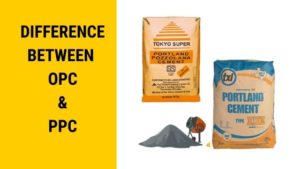Different types of cement are already discussed in the previous post. You can check it out if needed.
In this post, I am going to explain the major differences among the OPC and PPC [Ordinary Portland Cement and Pozzolana Portland Cement].
Difference between OPC and PPC :

If you are viewing the below table in Mobile device Scroll horizontally for better view.
| Description | OPC | PPC |
|---|---|---|
Definition | The word OPC stands for Ordinary Portland Cement | The word PPC stands for Pozzolana Portland Cement |
Raw Material | Ordinary Portland cement is a mixture of limestone, raw argillaceous, calcareous materials and gypsum. | Pozzolana cement is manufactured by mixing 30% of pozzolana to Ordinary Portland cement clinkers. |
Composition | OPC comprises of huge amount of Limestone powder in it | The pozzolana is a material which is formed due to the volcanic eruptions. It is a siliceous material having about 80% clay in it. |
Durability | The durability of concrete made by OPC is less when compared with PPC | The main motto of adding Pozzolana Materials to OPC is to enhance the Durability of Concrete |
Initial Strength | The initial strength of OPC is higher when compared with PPC which makes effective for construction | The initial strength is less but for longer duration, the strength of PPC is comparatively higher than OPC. |
Grades | Three different grades OPC33, OPC43, OPC53 grades of cement is available in market | There are no such grades in PPC, the strength of PPC matches the OPC33 grade.It is differentiated based on type of pozzolanic material added in OPC , the different types of Pozollonic materials are Fly ash, Volcanic tuff, Rice Husk ash |
Environmental Impact | OPC is an ecofriendly product where most of the materials present in cement is naturally available | PPC is more eco friendlier than OPC as the carbon footprints generated by manufacturing PPC is less when compared with OPC which reduces the environmental pollution |
Heat of Hydration | OPC generates more heat after mixing with the water which makes OPC is not suitable for mass casting. | PPC has a slow hydration process due to which heat generation is comparatively lower. |
Cost | OPC is more costlier than PPC | The price of PPC is less which makes the construction economic. |
Permeability and Fineness | Lower the fineness , higher the permeability. OPC has a fineness of 225m2/kg | PPC has a fineness of 300m2/Kg so it has lower permeability with higher durability |
Workability of Concrete | Good workable concrete can be achieved using OPC, but the workability is less than PPC | Concrete made with PPC has more workability than OPC |
Volume of Mortar | Volume of mortar achieved is less when compared with the PPC as OPC is less finer | The volume of mortar achieved by PPC is higher than OPC as PPC is less density |
Curing period | As per IS456:2000 the minimum curing period should not be less than 7 days when exposed to hot and extreme weather conditions, the minimum curing period should not be less than 10days | As per IS456:2000, the minimum curing period of any blended cement (PPC) the minimum curing period should not be less than 10 days and for hot conditions, 14 days is required. |
Resistance to chemical attacks | The resistance of Ordinary Portland cement to chlorides, sulfates is less | The resistance capacity of PPC to chlorides, sulfates etc is high for PPC |
Setting time | The initial setting time of OPC is 30mins The final setting time of OPC is 600mins | The initial setting time of PPC is 30mins. The final setting time of PPC is 600mins |
Also Read:
How to test the quality of cement on site
For Instant updates Join our Whatsapp Broadcast. Save our Whatsapp contact +919700078271 as Civilread and Send us a message “JOIN“
Never Miss an update Click on “Allow US“ and make us allow or Click on
Red notification bell at bottom right and allow notifications. Stay tuned!
Civil Read Wishes you ALL the BEST for your future..
Share With Your Friends| Sharing Is Caring:)


No Responses